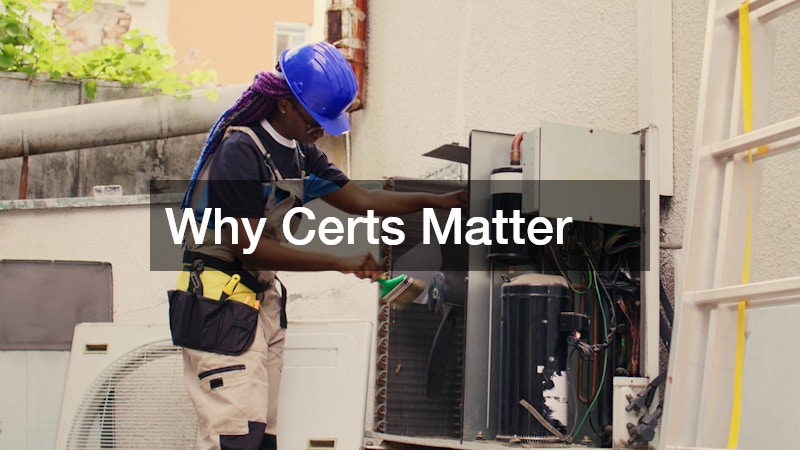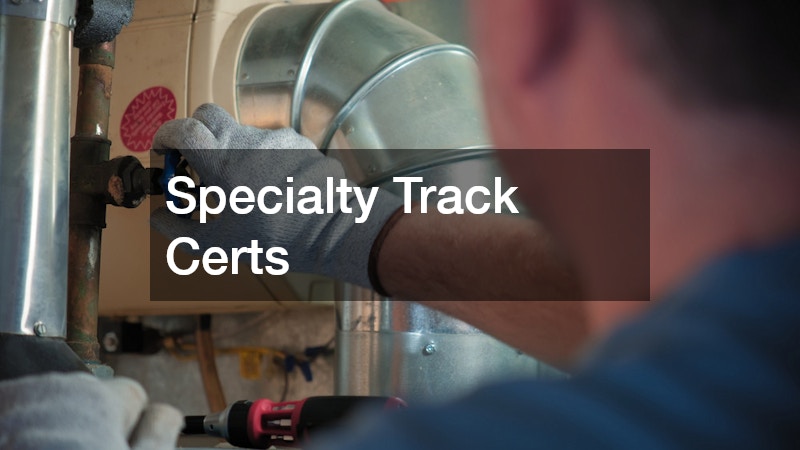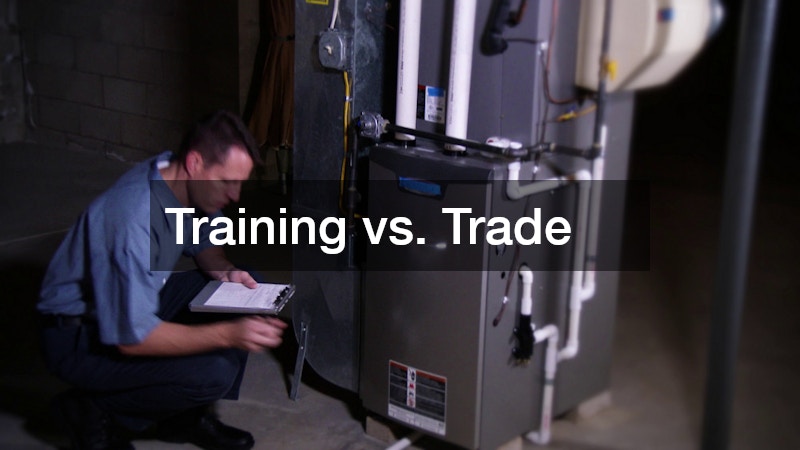The HVAC industry continues to grow steadily, offering a pathway into a high-demand trade that combines technical skill with long-term job stability. For those considering a career shift, this field provides numerous opportunities for advancement, specialization, and increased earnings. However, getting started requires more than interest and enthusiasm. One of the most critical steps toward success is obtaining the right certifications. Understanding the types of HVAC certifications available and how they align with your goals is essential.
Whether you’re looking to start a new job quickly, specialize in a specific area, or eventually become a master technician, certifications form the backbone of your credibility and skillset. For individuals who want to make a meaningful investment in their future, knowing which path to take—and what training to pursue—is a key part of long-term success.
Each section of this article is designed to guide you through a well-organized path: from understanding the importance of certification to exploring specialized tracks and comparing training options. If you’ve been looking for a practical, rewarding career that doesn’t require a four-year degree but still offers growth and financial upside, this article will help you see how the right certifications can get you there.
1. Why Certs Matter

Certifications are often the first thing employers look for when hiring for trades. They serve as a benchmark that proves you’ve received the proper training and possess an understanding of the systems and safety protocols. Without certification, you may still land entry-level positions, but you’ll likely be limited in terms of what tasks you can perform or how much responsibility you’re given. For this reason, getting certified is one of the most effective ways to launch or boost a career in the mechanical services industry.
On a more specific level, working in HVAC requires knowledge of electrical systems, fluid dynamics, thermodynamics, and environmental regulations. Certifications help validate your competence in these areas. For example, the Environmental Protection Agency (EPA) mandates specific certifications for handling refrigerants. Without that credential, a technician legally cannot work on certain systems. In short, certifications are often legally required.
Certifications also build confidence with clients and employers, providing peace of mind that you know what you’re doing and can perform high-stakes tasks without oversight. There are many types of HVAC certifications, each designed for a particular role or level of expertise. When you’re certified, you’re not just more employable; you’re also able to offer a wider range of services, which can translate into more clients.
2. Paths Into the Field
If you’re looking to change careers and enter a skilled trade, there are multiple ways to begin, ranging from apprenticeships to formal training programs. The path you choose often depends on your current experience, how quickly you want to start working, and whether you prefer learning in a classroom or on the job. Earning certifications early will open more doors and make you a more competitive candidate in the marketplace.
In roles like HVAC installation, certification is particularly useful because it directly correlates with hands-on proficiency. Employers want to know that the person they hire to set up heating and cooling systems has both the training and legal clearance to do so safely. This is where introductory certifications, like the EPA 608, come into play. This kind of certification allows new technicians to participate in more complex jobs sooner.
These initial certifications are often accessible through trade schools, community colleges, and technical institutes. Some programs even integrate certification testing into their curriculum, ensuring you graduate job-ready. The sooner you get certified, the sooner you’ll gain the freedom to choose your path within the industry.
3. Intro-Level Options

For those just getting started, it’s important to understand which certifications are best suited for beginners. Entry-level certifications generally focus on safety, equipment handling, and fundamental diagnostics. These credentials don’t require years of experience and can usually be completed in a few weeks or months. They’re ideal for individuals transitioning from unrelated fields who need a fast way to prove their competence and get hired quickly.
Many HVAC companies actively recruit new technicians who’ve recently obtained these starter certifications. These companies are often looking for dependable workers who are ready to learn on the job but still have enough baseline knowledge to avoid costly mistakes. Certifications like the HVAC Excellence Core, NATE Ready-to-Work, or EPA 608 (for refrigerants) are among the most respected for newcomers.
Introductory certifications give you access to the industry without requiring years of knowledge, making them a stepping stone for career changers. They demonstrate your initiative and also prove that you’re serious. As you gain experience, you can move on to more advanced credentials that require job hours or specializations while continuing to build on the foundational types of HVAC certifications you started with.
4. EPA 608 Explained
One of the most widely recognized and required credentials in the industry is the EPA Section 608 certification. This certification is mandated by the U.S. Environmental Protection Agency for any technician who works with refrigerants. Without it, you can’t legally service or dispose of systems that use controlled refrigerants—an essential part of many cooling and climate control units. It’s considered one of the foundational types of HVAC certifications and is often the first credential new technicians pursue.
For professionals working in heating and cooling services, the EPA 608 is not optional. It’s essential. This certification comes in four types: Type I (for small appliances), Type II (for high-pressure systems), Type III (for low-pressure systems), and Universal (which covers all three). Technicians choose which type to pursue based on the equipment they’ll be working with. Many choose the Universal certification to maximize job flexibility and reduce future limitations.
The certification exam consists of a core section and specific technical modules, all of which require preparation. Passing this test not only enables legal compliance but also boosts your resume significantly. It’s a signal to potential employers that you are equipped for real field work and that you’re committed to learning the rules and responsibilities tied to the role. It’s one of the most accessible yet impactful types of HVAC certifications for newcomers and seasoned workers alike.
5. Specialty Track Certs

As you gain more experience and start defining your career goals, specialized certifications can help you carve out a niche. Whether you want to focus on energy efficiency, system design, or specific types of equipment, there’s likely a certification tailored to your interests. These types of HVAC certifications go beyond the basics and demonstrate mastery in focused areas, making you more attractive to employers seeking expertise.
Professionals who want to become HVAC contractors, for example, may pursue credentials such as the NATE (North American Technician Excellence) certification in areas like air distribution, gas furnaces, or commercial refrigeration. Contractors who hold these credentials are often able to command higher rates and manage more complex projects independently.
Some states and municipalities require specialty certifications before issuing a contractor’s license. These advanced credentials often include continuing education requirements to stay current with technology and codes. In other words, earning specialty certifications is about staying relevant and legal in a highly regulated industry.
6. Master-Level Growth
Once you’ve established yourself in the industry and gained years of experience, you may consider pursuing master-level certifications. These high-level credentials represent extensive field experience, in-depth technical knowledge, and a commitment to excellence. Often, they are accompanied by state or national licensing exams and continuing education requirements, positioning you as a leader in your field. These types of HVAC certifications are ideal for those who want to supervise teams, launch their own businesses, or train the next generation of technicians.
In specialized roles like furnace repair, master-level credentials are especially useful. They demonstrate a deep understanding of combustion systems, airflow analysis, diagnostics, and safety standards. Organizations such as HVAC Excellence offer Master Specialist certifications that verify this level of competence.
Achieving master-level certification takes time, commitment, and often several years of hands-on work. However, the payoff can be significant. Whether you’re aiming for higher compensation, larger contracts, or the freedom to run your own business, master-level certification can set you apart. It’s the logical next step for anyone serious about turning a solid career into an exceptional one.
7. Training vs. Trade

When entering the HVAC field, one of the most important decisions you’ll make is how to gain your initial knowledge. Technical schools and trade programs offer structured instruction, often with access to labs and certified instructors. On the other hand, apprenticeships provide hands-on learning under experienced professionals. Each path has benefits, but the best approach often involves a mix of both, especially when working toward the various types of HVAC certifications required for career growth.
For those planning to work in heating and air system maintenance, combining classroom education with field experience is particularly effective. Understanding airflow systems, load calculations, and diagnostic tools requires both theoretical knowledge and practical application. Certifications that require passing an exam, like NATE or HVAC Excellence, often draw directly from what you learn in school or on the job. Choosing a program that offers certification testing as part of the curriculum can give you a head start in landing a job.
Your choice between school and trade experience should align with your long-term goals. If you’re looking to become a technician quickly, an apprenticeship might get you there faster. But if you want to broaden your skills and qualify for multiple roles, formal training followed by fieldwork may be more effective. Regardless of the path, what matters most is your ability to complete the right types of HVAC certifications that demonstrate readiness, competence, and dedication.
8. Boosting Your Pay
For many career changers, one of the main motivations is the potential to earn more money. In the HVAC industry, your income often scales with your certification level. Employers are willing to pay more for certified workers because it saves them time, reduces liability, and improves customer satisfaction. Holding the right types of HVAC certifications proves you can take on more complex jobs, work without supervision, and meet industry standards, making you more valuable from day one.
Smaller or independent local HVAC companies especially value certified technicians who can perform a wide range of services. Technicians with multiple certifications can fill this need more easily and, in return, may earn higher wages or faster promotions. These businesses also appreciate employees who don’t require constant oversight and can immediately meet regulatory requirements.
In addition to higher base pay, certified professionals often qualify for bonuses, overtime opportunities, and leadership roles. The financial benefits multiply as you stack credentials and gain specialized knowledge. While certification does require time and money up front, the return on investment can be significant over a relatively short period. For anyone looking to improve their financial outlook, focusing on the right types of HVAC certifications can be a smart and strategic move.
9. Picking a Program
Choosing the right training program is a crucial step toward launching a successful career in this field. There are many options—community colleges, trade schools, online programs, and union apprenticeships. The best programs not only teach essential skills but also prepare students for certification exams. A quality training program should directly support the pursuit of different types of HVAC certifications that match your goals.
If you’re aiming to work in HVAC repairs, you’ll want a program that emphasizes troubleshooting and diagnostics. Look for curricula that include real-world simulations, access to industry-standard tools, and instructors who are certified professionals themselves. Programs that align with national certification organizations, like NATE or HVAC Excellence, ensure your training is relevant and that you’ll be well-prepared for the exams that matter most to employers.
Before enrolling, take the time to compare graduation rates, job placement services, and course reviews. Make sure the program’s outcomes are transparent and that there’s a clear pathway from education to employment. The right school will set the foundation for long-term career success. It’ll also help you earn the types of HVAC certifications that employers look for when hiring top talent.
10. Next Steps to Take
Once you’ve decided to pursue a career in the HVAC industry, it’s time to put a plan into action. The journey begins by researching the certifications best suited to your goals. Once you’ve researched, you can enroll in a program or apprenticeship and commit to learning the trade. Taking initiative early will help you avoid delays and move confidently toward a stable, well-paying career. The field is full of opportunity, but your ability to take advantage of it starts with earning the certifications.
If you’re interested in roles like ac repairs, certifications related to air conditioning diagnostics, refrigerant handling, and electrical systems are critical. These specialties often require more than just on-the-job training; they call for formal credentials to meet safety and compliance standards. Organizations like NATE or HVAC Excellence offer exams that test your competence in these areas and demonstrate your readiness to employers and clients.
Create a timeline that includes your education, certification testing, and entry into the workforce. Keep your long-term goals in mind. Continual learning is part of this profession, so be prepared to renew certifications and stay current with new technologies. Starting strong by earning the right types of HVAC certifications now will help you secure a future that’s both profitable and professionally fulfilling.
Getting Certified and Beyond
Deciding to enter a new career field is never easy, but when that field is growing, in-demand, and offers the potential for upward mobility, the decision becomes much clearer. The HVAC industry is one of those rare opportunities where practical skills are valued, job security is high, and advancement is tied directly to your effort and education. As this article has shown, the key to unlocking those benefits lies in understanding and pursuing the right types of HVAC certifications.
Throughout this guide, we’ve explored what makes certifications so essential, from basic legal compliance to gaining specialized skills that increase your value to employers. The types of HVAC certifications you choose will shape your role, responsibilities, and earning potential. They show employers and clients that you’re committed, qualified, and serious about your work. If you’re ready for a career that pays well, offers variety, and allows you to grow, there’s no better time to get certified and step into the future you deserve.

